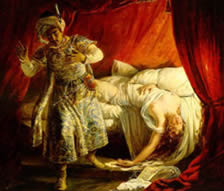Verena Theile, Ph.D.

Visiting Assistant Professor |
| English 102: Sample Summary Analysis |
Complete MLA citation: |
Hopkins, Lisa. “‘This is Venice: my house is not a grange’: The Sheep and the Goats in Othello.” The Upstart Crow 20 (2000): 68-78. |
| Summary Analysis: |
In this article, Lisa Hopkins analyzes the importance of animals and allusions to animals in Shakespeare’s tragedy Othello, the Moor of Venice. To set up her argument, Hopkins explains the importance of the “green world” in Shakespeare’s comedies as a place of retreat, and she suggests an inversion of this same concept in his tragedies, where imagery of death and decay create a dominant impression. The quote in the title of her paper, “This is Venice: my house is not a grange” (1.1.104-5), however, contradicts this pattern, as Venice is established as a place devoid of characteristics, pastoral or urban. Instead it is defined by what it is not, thus suggesting another source for what Hopkins refers to as an inverted retreat. Hopkins agues that Iago’s statement “Our bodies are our gardens, to which our wills be gardeners” sets the tone of the play, in that Iago’s belief in man’s infinite power and free will stand in sharp contrast to Cassio’s trust in pre-determination, Desdemona’s Catholic outlook, and Othello’s constant swaying between self-confidence and nagging doubt. Iago’s view, of course, is the most intriguing of the four, suggesting an interesting twist to the typical “man-in-the-garden” perspective (69). In Iago’s mind, man-is-the-garden as well as the gardener, which, obviously, invests man with the power to cultivate and thus manipulate his surroundings. It is the human mind then which personifies the “inversion” of the green world. The animal imagery that permeates the play stands in close connection to Iago’s perception of the world. To him, everything that is not controlled by free will is essentially animalistic. As such, love, for example, is animalistic, and so Iago has no patience with Roderigo when the latter decides to drown himself because of his love for Desdemona: “Ere I would say I would drown myself for the love of a guinea-hen I would change my humanity with a baboon” (1.3.315-17). The self is superior to love, and only animals commit their free will and their physical being to its service. Othello and Desdemona are the perfect examples of this absurdity to Othello; from the very beginning of the play, he describes them as a “black ram” and its “ewe,” and even Othello’s own repetition of “Goats and monkeys!” reflect the basic animalistic feature of love, lust, and lechery. In Iago’s dangerously blasphemous perception of man’s omnipotence, Hopkins argues, the mind rules over everything. It is therefore crucially important that Iago’s hatred of Othello is “hearted” and his intent to execute revenge upon him so absolute that nothing (and nobody) else matters. Othello, on the other hand, is inconsistent; he sways back and forth between believing in his own supremacy to nature and his subordination to her. Sometimes he commands the wind, and sometimes he is a mere “wind instrument…played by somebody else” (73). It is Othello’s lack of confidence, Hopkins claims, that ultimately brings about his downfall. Throughout the play, Iago is acutely aware of Othello’s mutability. He constantly maintains that Othello’s mind can easily be changed, because “Moors are changeable in their wills” (1.3.347). The strawberry-spotted handkerchief becomes the chief instrument in Iago’s plot to take advantage of Othello’s uncertainty, and Hopkins reminds her readers that the serpent too hid under a strawberry leaf before instigating humanity’s first sin and fateful fall from grace. With free will up on the table and the human mind as the microcosm, ruling the world while at the same time representing the world, everything is up for grabs in Othello, the play, and Othello, the man: “Beset thus by temptation, Othello is Adam, making his choice in a garden of the mind” (75). The Upstart Crow is a peer-reviewed journal for the sudy of Shakespeare and operates out of Clemson University in South Carolina. Lisa Hopkins, a renowned Renaissance scholar and faculty member at Sheffield Hallam University, develops an interesting and sophisticated argument in her article on Shakespeare's Othello. Her Iago is the archetypal villain, the serpent in the Garden of Eden, the fallen angel tempting humankind to follow in his steps. But he is also an early “modern” man and a Renaissance humanist, who is firmly convinced of humanity’s infinite capabilities. To Iago, human faculties far exceed divine expectations; exploitation of natural forces includes and excels in the careful manipulation of other human beings. Ultimately, I think Hopkins’ argument falls short of highlighting these characteristics of Iago. She hints at them, but she does not delve into them. Her application of Frye’s “green world” concept, however, is useful and succeeds in setting up a whole array of fascinating points of study. It would have been helpful if she had dug a little deeper in terms of animalism and inferiority, perhaps even highlighting the racial implications of “the black ram tuppin’ a white ewe." |
Last updated November 2007 |